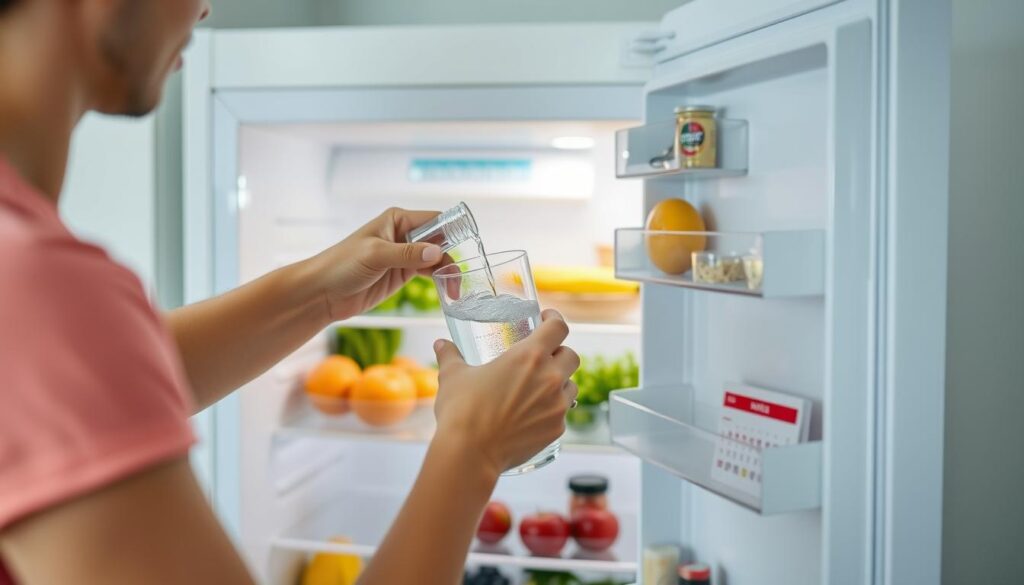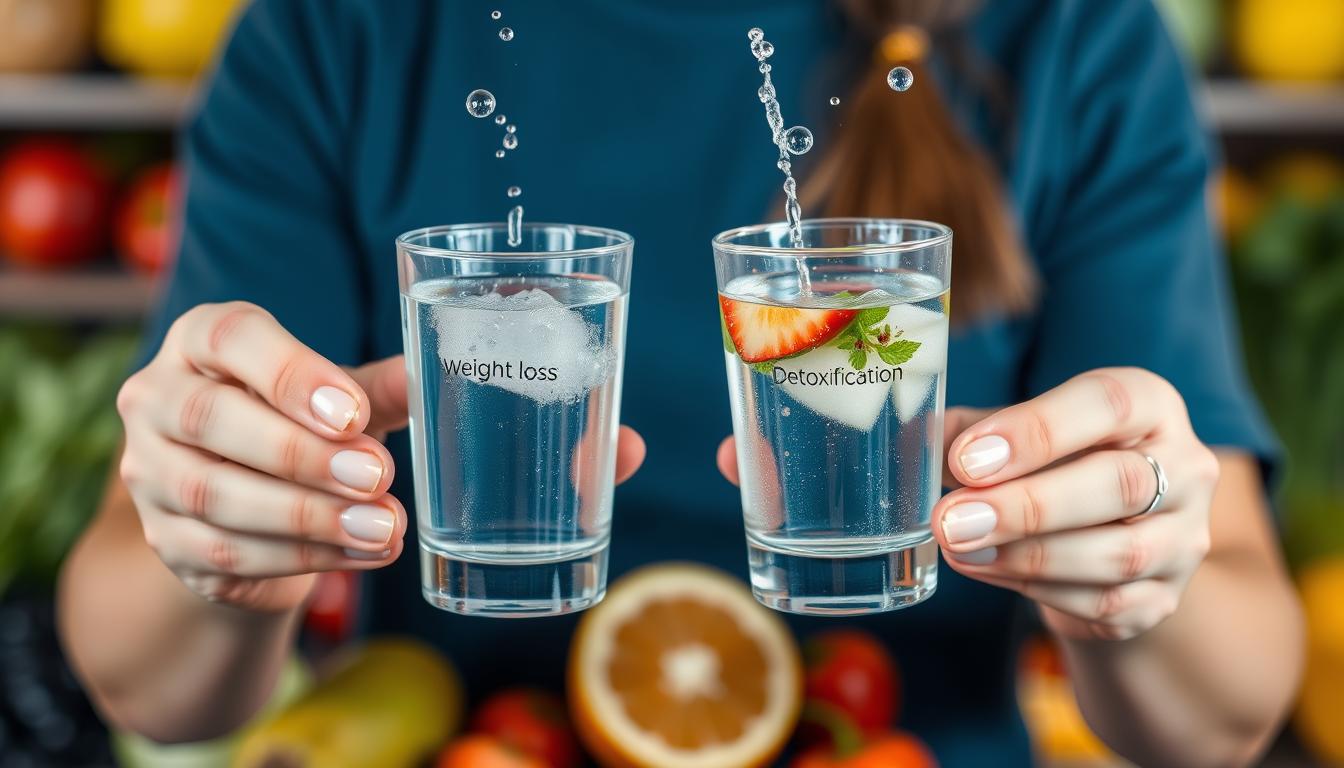Are you looking for a way to lose weight, detox, and boost your health? A water diet might be what you need. It’s a popular way to cleanse and lose weight by focusing on water. But what is it, and how does it work?
A water diet means drinking only water for a few days. You skip solid foods and other drinks. This helps your body cleanse and heal. Many people feel more energized and clear-headed after a water fast.
One big plus of a water diet is it can help you lose weight fast. By eating fewer calories, your body uses stored fat for energy. Drinking water also helps you feel full, making it easier to stick to your fast.
But there’s more to it than just losing weight. Water is key for many body functions, like digestion and keeping your body temperature right. Drinking only water helps your body get the hydration it needs. Plus, many people notice their metabolism speeds up during and after a fast, helping them keep the weight off.
Remember, starting a water diet should be done with care and advice. Always talk to your doctor before trying it out. Pregnant women, kids, and people with certain health issues should not fast with water.
Key Takeaways:
- A water diet involves consuming only water for a set period, usually 24-72 hours
- Water fasting can jumpstart weight loss by reducing calorie intake and promoting fat burning
- Staying hydrated during a water diet is crucial for maintaining bodily functions and overall health
- A water diet may provide a metabolism boost, aiding in long-term weight management
- Consulting with a healthcare professional before starting a water diet is essential for safety and appropriateness
What is a Water Diet and How Does it Work?
A water diet, also known as water fasting, is a method for quick weight loss and detox. It means eating only water for a few days, usually 24 to 72 hours. During this time, the body gets all its hydration and minerals from water alone.
Understanding the Basics of Water Fasting
Water fasting is getting popular for losing weight fast and cleaning the body. It’s important to listen to your body and not fast for more than 72 hours without a doctor’s advice. Experts suggest keeping water fasts between 24-48 hours to avoid health risks.
When fasting with water, the body goes into a state called ketosis. It starts to use stored fat for energy. This can lead to losing up to 2 pounds a day. But remember, the first weight loss might be from water, carbs, and muscle too.
The Role of Hydration in Weight Loss and Overall Health
Drinking enough water is key during a fast, as it’s the only source of hydration. Experts say to drink 2-3 liters of water daily, choosing mineralized water to replace lost electrolytes. Staying hydrated helps with detox, losing weight, and keeping healthy.
Being well-hydrated can help control hunger, boost metabolism, and clear out toxins. It’s also vital for many body functions like keeping temperature in check, moving nutrients around, and keeping joints lubricated. Not drinking enough water can cause tiredness, headaches, constipation, and dizziness.
Water is the driving force of all nature. – Leonardo da Vinci
Water fasting isn’t right for everyone. People with diabetes, gout, or eating disorders should not do it without a doctor’s watchful eye. Always talk to a healthcare professional before starting any new diet or fasting plan.
| Duration | Weight Loss Potential | Risks |
|---|---|---|
| 24 hours | 0.5-2 pounds | Mild dehydration, headaches |
| 48 hours | 1-4 pounds | Dehydration, electrolyte imbalance |
| 72 hours | 2-6 pounds | Severe dehydration, muscle loss |
In conclusion, a water diet can help with quick weight loss or detox. But, it’s important to be careful and get advice from a healthcare professional. Listening to your body and staying hydrated are key to a safe and successful fast.
Benefits of a Water Diet: Weight Loss, Detoxification, and More
A water diet, also known as water fasting, can greatly improve health and well-being. It helps with weight loss and supports detoxification. Let’s look at the main benefits of trying a water fasting journey.

How a Water Diet Can Help You Shed Pounds Quickly
One big plus of a water diet is its potential for quick weight loss. By only drinking water, you cut your calorie intake. This can lead to losing weight. Studies show that drinking water before meals helps overweight adults lose more weight.
Drinking water also makes you feel less hungry. This can mean eating less during meals. Staying hydrated with water can help you eat less and lose weight.
Detoxifying Your Body Through Water Fasting
Some people believe water fasting helps detoxify the body. It supports the body’s natural process of getting rid of toxins. But, there’s not much science backing this idea yet.
Even though the body has ways to detox itself, water fasting might help a bit. But we need more research to be sure.
Potential Improvements in Metabolic Health and Inflammation
A water diet might also improve metabolic health and reduce inflammation. Drinking water can boost your metabolism for a while. This can help with weight control.
Water fasting might also make your cells recycle old, harmful parts. Some studies suggest it can lower inflammation. Inflammation is linked to many chronic diseases.
| Benefit | Supporting Evidence |
|---|---|
| Weight Loss | Overweight adults who drank 17 ounces (half a liter) of water before meals lost 40% more weight than those who didn’t. |
| Increased Metabolic Rate | Studies show that drinking 17 ounces (half a liter) of water can increase metabolic rate by up to 30% for about an hour. |
| Reduced Hunger | Drinking water has been linked to reduced hunger, potentially leading to eating less during meals. |
| Improved Mood and Energy | Increasing water intake from less than 41 ounces (1.2 liters) to 85 ounces (2.5 liters) per day can lead to increased happiness, more energy, and a calmer state. |
While a water diet has many benefits, it’s important to be careful. Talk to a healthcare professional before starting, especially if you’re young, old, pregnant, or have health issues.
Preparing for a Water Diet: Tips and Precautions
Before starting a water diet, make sure you’re ready physically and mentally. It’s important to take the right steps and follow key tips. This ensures you can safely and effectively enjoy the benefits of your water diet.
Consulting with a Healthcare Professional Before Starting
Getting advice from a healthcare professional is a key step before a water diet. This is crucial if you have health issues or take medications that fasting might affect. Your doctor can tell you if a water diet is safe for you and guide you on how to fast safely.
Choosing the Right Duration for Your Water Fast
Choosing the right fasting time is vital. Think about your experience and health. Beginners should start with short fasts, like 12-24 hours, and increase the time as they get used to it. Here are some fasting times and their benefits:
| Fasting Duration | Potential Benefits |
|---|---|
| 12-13 hours | Initiates metabolic changes and growth hormone secretion |
| 14-15 hours | Enhances fat burning and ketone production |
| 16-18 hours | Promotes autophagy and cellular repair |
| 24 hours | Supports detoxification and intestinal cell regeneration |
| 36-48 hours | Targets stored sugar and helps overcome weight loss resistance |
| 3-5 days | Boosts immune function and may benefit chronic conditions |
Longer fasts should only be tried by those with experience and under a doctor’s watch.
Preparing Your Body and Mind for the Fasting Period
Getting ready for your water diet means preparing your body and mind. Slowly cut down on food before fasting, eating foods that are good for you and easy to digest. This can ease side effects and make fasting easier.
Mindfulness practices, like meditation or deep breathing, can help with emotional or mental challenges during fasting.
By preparing well for your water diet, getting advice from a healthcare professional, picking the right fasting time, and taking care of your body and mind, you’ll be ready for a safe and rewarding fasting journey.
Implementing a Water Diet: A Step-by-Step Guide
Starting a water diet needs careful planning and execution for a safe and effective fasting experience. This guide will help you through the process of starting a water diet. It aims to help you reach your weight loss and detox goals.
- Set a clear intention and timeline for your water diet. Decide how long you want to fast based on your health and goals. Beginners should start with a fast of 24-72 hours. Those with more experience might choose longer fasts.
- Get your body and mind ready for the fast a few days before. Slowly cut down on solid foods, eating light and easy-to-digest meals. Start doing gentle exercises and meditation to ease into fasting.
- While fasting, drink lots of water throughout the day. Aim for 2-3 liters to help your body detox. You can also have herbal teas and water with lemon for taste.
- Rest and listen to your body during the fast. Fasting is hard on your body and mind, so save your energy. Do some light stretching, meditation, or reading to keep your mind busy and stress low.
- Watch how you feel and take care of yourself. If you feel dizzy, weak, or confused, stop fasting and get medical advice. Always put your health and safety first.
For beginners, starting with a plant-based diet is a good way to ease into fasting. A beginner’s guide to plant-based eating can help you start a healthier eating habit.

As you go through your water diet, pay attention to how your body feels. You might find that short, more frequent fasts suit you better, or you might prefer longer, less frequent ones.
| Fasting Method | Description | Duration |
|---|---|---|
| Intermittent Fasting (16/8) | Fast for 16 hours, eat within an 8-hour window | Daily |
| Alternate Day Fasting | Fast every other day, eat normally on non-fasting days | Ongoing |
| Extended Fasting | Fast for a prolonged period, typically 48-120 hours | Occasional |
Intermittent fasting is popular for its flexibility, ease, and health benefits. It can lead to quick weight loss and improve heart health and brain function.
Follow this guide and add the water diet to your life for better health. Be patient, kind to yourself, and focused on feeding your body and mind.
Breaking Your Water Fast: Reintroducing Food Safely
After a water fast, it’s key to slowly add solid foods back into your diet. This helps your digestive system adjust without discomfort or serious issues. By following some simple steps, you can smoothly return to eating normally.
The Importance of Gradually Reintroducing Solid Foods
Start with small amounts of easy-to-digest foods when you begin eating again. This helps your body get used to solid foods again. Good choices include:
- Fresh fruits like watermelon, papaya, and berries
- Steamed or cooked vegetables such as spinach, carrots, and sweet potatoes
- Soft, cooked whole grains like oatmeal or quinoa
- Soups and broths with simple ingredients
Listen to your body as you start eating again. If you feel bad or have digestive problems, slow down. Increase your food amounts and types over a few days, focusing on foods that are good for you.
“Reintroducing food slowly and mindfully is key to avoiding digestive distress and ensuring a successful transition back to a regular eating pattern after a water fast.” – Dr. Emily Harrison, Nutritionist
Choosing Nutrient-Dense Foods for Optimal Recovery
When you start eating again, choose foods that are full of nutrients to help your body recover. Great foods for after a fast include:
| Food Group | Examples | Benefits |
|---|---|---|
| Fruits | Berries, citrus fruits, apples, pears | Rich in vitamins, minerals, and antioxidants |
| Vegetables | Leafy greens, cruciferous veggies, squash | High in fiber, vitamins, and minerals |
| Whole Grains | Brown rice, quinoa, whole wheat bread | Provide complex carbohydrates and B vitamins |
| Lean Proteins | Eggs, fish, poultry, legumes | Essential for muscle recovery and overall health |
| Healthy Fats | Avocados, nuts, seeds, olive oil | Support brain health and nutrient absorption |
Focus on these foods to help your body recover and keep the health benefits from your fast. Don’t forget to drink plenty of water and avoid foods that are hard on your stomach, like processed or high-fat ones.
Water Diet 101: Everything You Need to Know to Get Started
Thinking about trying a water diet? It’s key to know the basics and health tips first. This diet means fasting for 16 to 48 hours, only drinking water, black coffee, or tea. It can help with fat loss, but start with care and prep to stay safe.
Before starting, talk to a doctor to see if it fits your needs and goals. Pregnant or nursing moms, kids, seniors, and those with health issues should skip water fasting. Start with a 14 or 16-hour fast before going longer. Drink lots of water and think about electrolyte supplements if needed.
When you break your fast, ease back into solid foods. Go for easy-to-digest foods like broths, soups, and fresh fruits and veggies. Don’t overeat or go for heavy foods right away. A water diet can help with weight loss and detox, but it’s not a long-term health fix.
With the right mindset and doctor’s advice, a water diet can be a great health boost. Knowing the basics and health tips, and starting slowly, can help you safely try a water diet.




